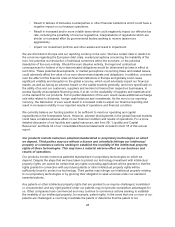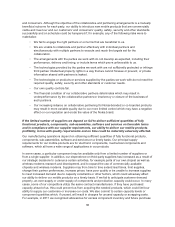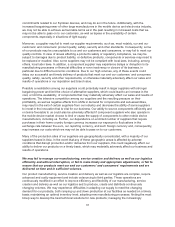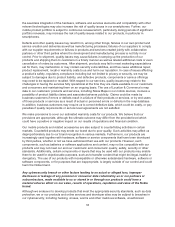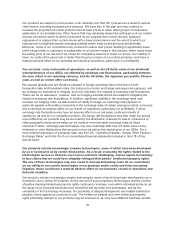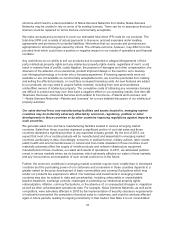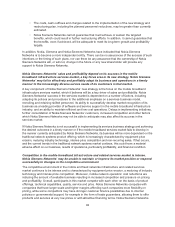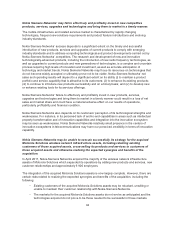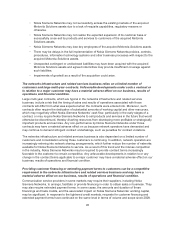Nokia 2011 Annual Report Download - page 40
Download and view the complete annual report
Please find page 40 of the 2011 Nokia annual report below. You can navigate through the pages in the report by either clicking on the pages listed below, or by using the keyword search tool below to find specific information within the annual report.financial statements included in Item 18 of this annual report for more detailed information on
geographic location of net sales to external customers, segment assets and capital expenditures.
Changes in various types of regulation, technical standards and trade policies as well as
enforcement of such regulation and policies in countries around the world could have a
material adverse effect on our business and results of operations.
Our business is subject to direct and indirect regulation in each of the countries where we, the
companies with which we work, and our customers do business. We develop many of our products
based on existing regulations and technical standards, our interpretation of unfinished technical
standards or there may be an absence of applicable regulations and standards. As a result, changes in
various types of regulations, their application and trade policies applicable to current or new
technologies or products may adversely affect our business and results of operations. For example,
changes in regulation affecting the construction of base stations and other network infrastructure could
adversely affect the timing and costs of new network construction or expansion and the commercial
launch and ultimate commercial success of those networks. Export control, tariffs or other fees or
levies imposed on our products and environmental, health, product safety and security, consumer
protection and other regulations that adversely affect the export, import, pricing or costs of our
products could also adversely affect our sales and results of operations. For example, copyright
collecting societies in several member states of the EU as well as in several other countries claim that
due to their capability to play and store copyrighted content, mobile devices should be subject to
similar copyright levies that are charged for products such as compact disc, digital video disc or digital
audio players. Any new or increased levies and duties could result in costs which lead to higher prices
for our products, which may in turn impair their demand or decrease profitability if such costs cannot be
passed to customers. In Brazil, consumer protection agencies are seeking to implement a requirement
that certain mobile devices under warranty and claimed to be defective must be immediately replaced
at the point of sale. If such measures are introduced, our costs in Brazil would increase. In addition,
changes in various types of regulations or their application with respect to taxation or other fees
collected by governments or governmental agencies may result in unexpected payments to be made
by us, and in response to difficult global economic conditions there may be an increase in the
aggressiveness of collecting such fees.
Our expansion into the provision of services, including the establishment of our Location & Commerce
business, has resulted in a variety of new regulatory issues and subjects us to increased regulatory
scrutiny. Moreover, our competitors have employed and will likely continue to employ significant
resources to shape the legal and regulatory regimes in countries where we have significant operations.
Legislators and regulators may make legal and regulatory changes or interpret and apply existing laws
in ways that make our services less appealing to the end users, require us to incur substantial costs,
change our business practices or prevent us from offering our services.
The impact of changes in or uncertainties related to regulation and trade policies could affect our
business and results of operations adversely even though the specific regulations do not always
directly apply to us or our products. In many parts of the world where we currently operate or seek to
expand our business, local practices and customs may be contrary to our code of conduct and could
violate anticorruption laws, including the US Foreign Corrupt Practices Act and the UK Bribery Act
2010. Our employees, or others who act on our behalf, could violate policies and procedures intended
to promote compliance with anticorruption laws. Violations of these laws by our employees or others
who act on our behalf, regardless of whether we participated in such acts or knew about such acts at
certain levels of our organization, could subject us and our employees to criminal or civil enforcement
actions, including fines or penalties, disgorgement of profits and suspension or disqualification from
sales. Additionally, violations of law or allegations of violations may result in the loss of reputation and
business. Detecting, investigating and resolving such situations may also result in significant costs,
38


